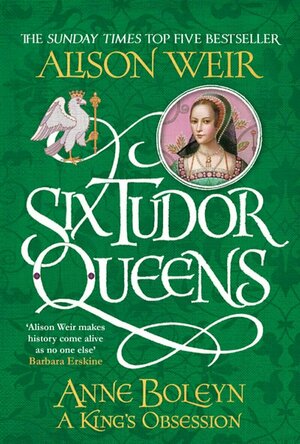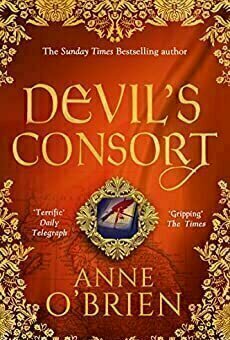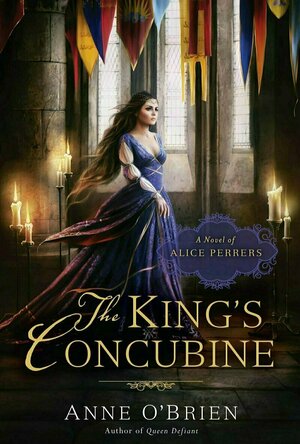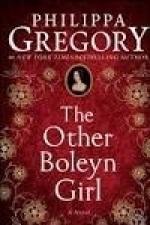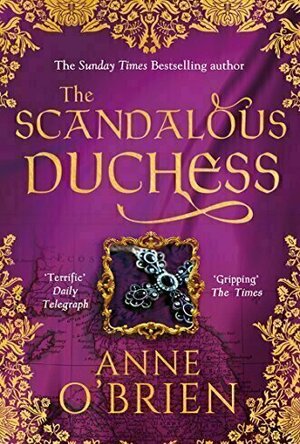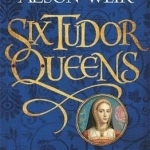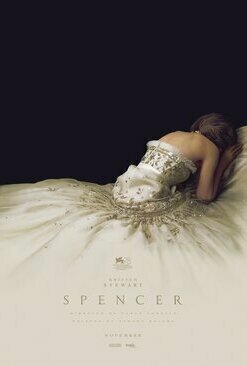Search
Search results
Lyndsey Gollogly (2893 KP) rated Anne Boleyn: A Kings Obsession (Six Tudor Queens #2) in Books
Oct 10, 2021
165 of 250
Book
Anne Boleyn:A Kings Obsession (Six Tudor Queens book 2)
By Alison Weir
Once read a review will be written via Smashbomb and link posted in comments
Anne Boleyn: A King's Obsession by bestselling historian Alison Weir, author of Katherine of Aragon: The True Queen, is the second captivating novel in the Six Tudor Queens series. An unforgettable portrait of the ambitious woman whose fate we know all too well, but whose true motivations may surprise you. Essential reading for fans of Philippa Gregory and Elizabeth Chadwick.
'Offers a spellbinding solution to the mystery of Anne's true nature . . . Enthralling' Sarah Gristwood
The young woman who changed the course of history.
Fresh from the palaces of Burgundy and France, Anne draws attention at the English court, embracing the play of courtly love.
But when the King commands, nothing is ever a game.
Anne has a spirit worthy of a crown - and the crown is what she seeks. At any price.
ANNE BOLEYN. The second of Henry's Queens. Her story.
History tells us why she died. This powerful novel shows her as she lived.
I absolutely love how this author writes! I was hooked from the start with this book. Anne Boleyn is one of those women who started with such good intentions but then became all dark and twisted! I have zero sympathy for how her life played out but found her story totally captivating. This is definitely a series worth reading!
Book
Anne Boleyn:A Kings Obsession (Six Tudor Queens book 2)
By Alison Weir
Once read a review will be written via Smashbomb and link posted in comments
Anne Boleyn: A King's Obsession by bestselling historian Alison Weir, author of Katherine of Aragon: The True Queen, is the second captivating novel in the Six Tudor Queens series. An unforgettable portrait of the ambitious woman whose fate we know all too well, but whose true motivations may surprise you. Essential reading for fans of Philippa Gregory and Elizabeth Chadwick.
'Offers a spellbinding solution to the mystery of Anne's true nature . . . Enthralling' Sarah Gristwood
The young woman who changed the course of history.
Fresh from the palaces of Burgundy and France, Anne draws attention at the English court, embracing the play of courtly love.
But when the King commands, nothing is ever a game.
Anne has a spirit worthy of a crown - and the crown is what she seeks. At any price.
ANNE BOLEYN. The second of Henry's Queens. Her story.
History tells us why she died. This powerful novel shows her as she lived.
I absolutely love how this author writes! I was hooked from the start with this book. Anne Boleyn is one of those women who started with such good intentions but then became all dark and twisted! I have zero sympathy for how her life played out but found her story totally captivating. This is definitely a series worth reading!
Deborah (162 KP) rated Devil's Consort in Books
Dec 21, 2018
This is the third book by Anne O'Brien I have read recently, and I have found her to be a very readable author - far better that the dull Gregory, if you want my opinion! All three of the novels I have read have been written in the first person, which is a narrative technique that I don't generally care for as it often feels too contrived and limits the point of view (see Philippa Gregory!). However, O'Brien, for me, has managed to pull this off and the first person narrative works for her and gives you a real empathy with her protagonists.
This was a good read and a good piece of historical Fiction, with perhaps a bit more emphasis on the Fiction element, as a few incidents I'm not convinced actually happened, or have been embroidered in the retelling. This deals with Eleanor's earlier life, from just before she becomes Queen of France to just after she becomes Queen of England. There could be a whole other book to be written on her life after the end of this book!
O'Brien made Eleanor come alive for me as a person, even if, as I have already said, I did have some reservations on historical accuracy. I think that if an historical novelist gives you a real feel for a person and makes you want to know more, then they have certainly done their job. There are some good biographies on Eleanor out there, so hopefully readers of this novel will feel inspired to seek them out.
This was a good read and a good piece of historical Fiction, with perhaps a bit more emphasis on the Fiction element, as a few incidents I'm not convinced actually happened, or have been embroidered in the retelling. This deals with Eleanor's earlier life, from just before she becomes Queen of France to just after she becomes Queen of England. There could be a whole other book to be written on her life after the end of this book!
O'Brien made Eleanor come alive for me as a person, even if, as I have already said, I did have some reservations on historical accuracy. I think that if an historical novelist gives you a real feel for a person and makes you want to know more, then they have certainly done their job. There are some good biographies on Eleanor out there, so hopefully readers of this novel will feel inspired to seek them out.
Deborah (162 KP) rated The King's Concubine in Books
Dec 21, 2018
This is the second novel by Anne O'Brien that I have read recently, and I have enjoyed them both. Although both novels were written in the first person, a narrative technique that I usually don't like as it is difficult for authors to pull off, I have found O'Brien's writing convincing and applaud her for this.
The protagonist of this particular novel is Alice Perrers, best known as mistress to Edward III. Not an awful lot, it seems, is really known about Alice, at least before her time at court. O'Brien has used known facts and woven her story about these, filling in the gaps with imagination and probability. Historically, Alice Perrers has never come across as a particularly nice person, seeming to be greedy, grasping and manipulative. O'Brien doesn't do a total whitewash job on her, but she does give a more sympathetic portrayal. Her Alice is still keen to acquire land holdings, but seen as a woman who has come from practically nothing and can see what her future might be without royal patronage, it is difficult to really blame her. History has always tended to be written by the victors and by men, and in medieval times they would not have liked a woman stepping out of her 'place' so it is quite understandable that Alice Perrers should have been so vilified.
Overall, I thought this was a good read. I read Vannora Bennett's The People's Queen a while back, which is also about Alice Perrers (she seems to be enjoying something of a renaissance!) but I preferred O'Brien's book. The cover gives O'Brien a plaudit of being 'better than Philippa Gregory'. Well, I can't argue with that as I haven't cared much for either of the books by Gregory that I have read, so I will wholeheartedly agree that O'Brien is much more worth reading! I look forward to her book on Eleanor of Aquitaine.
The protagonist of this particular novel is Alice Perrers, best known as mistress to Edward III. Not an awful lot, it seems, is really known about Alice, at least before her time at court. O'Brien has used known facts and woven her story about these, filling in the gaps with imagination and probability. Historically, Alice Perrers has never come across as a particularly nice person, seeming to be greedy, grasping and manipulative. O'Brien doesn't do a total whitewash job on her, but she does give a more sympathetic portrayal. Her Alice is still keen to acquire land holdings, but seen as a woman who has come from practically nothing and can see what her future might be without royal patronage, it is difficult to really blame her. History has always tended to be written by the victors and by men, and in medieval times they would not have liked a woman stepping out of her 'place' so it is quite understandable that Alice Perrers should have been so vilified.
Overall, I thought this was a good read. I read Vannora Bennett's The People's Queen a while back, which is also about Alice Perrers (she seems to be enjoying something of a renaissance!) but I preferred O'Brien's book. The cover gives O'Brien a plaudit of being 'better than Philippa Gregory'. Well, I can't argue with that as I haven't cared much for either of the books by Gregory that I have read, so I will wholeheartedly agree that O'Brien is much more worth reading! I look forward to her book on Eleanor of Aquitaine.
graveyardgremlin (7194 KP) rated The Other Boleyn Girl in Books
Feb 15, 2019
Going into <b>The Other Boleyn Girl</b> I already knew that the historical details weren't very factual, but I had this laying around and needed something both light and set in the past, so I figured this would do nicely. The writing itself is perfectly fine, and mostly, I did enjoy the book. Although, for the first half, it seemed as if everyone only wore red and by the end I got so sick of hearing about Anne's "B" for Boleyn necklace I could scream.
Mary Boleyn, the narrator, is a strange character: sympathetic and of reasonable intelligence one minute, a moronic irritant the next. Personality-wise she went up and down and back and forth. First she was fine not being the King's favorite anymore and seeming to want to leave the court life for the country to be with her children, then she was jealous of a title Anne received, years after the affair between Mary and Henry was over. Possibly this was put in as part of the rivalry between the sisters, but it didn't contextually fit. Her development could have used more work and she didn't mature or change much throughout the whole book, especially between the years 1522 to 1533. I seriously got tired of everybody's patronizing and calling her a fool all the time. They should have just named the book, <b>The Foolish Boleyn Girl</b>. I find it hard to believe Mary was so ignorant the king would have continued to have her as mistress for four years, give or take. She had to offer something other than good looks and being great in the bedroom. Anne herself sure was a piece of work, and even though she was pretty much evil throughout the book, I did still feel sorry for her at the end. Jane Parker was a one-dimensional malicious harpy who wasn't given a reason why she was that way; she was just the resident baddy to the Boleyns. To me, it felt like defamation of character.
Politics and the separation of the Church of England from the Catholic Church were merely mentioned in passing as court life and its primary players took center stage. The whole incest plot, I could have done without. Now if it were the absolute truth then it'd be okay, but since it's highly debatable and based on hearsay, I found it unnecessary and gratuitous. Around the two-thirds mark, the pace let up and it became more sluggish and boring, and it wasn't until the last sixty pages that it recaptured my attention again.
As long as readers know going into this book that the history has been twisted around and invented for pure sensation, then it's fine as a fictional read, but take any "facts" with a grain of salt. While it was an okay read, I didn't love it, but it managed to divert my attention for a few days.
One last note dealing with the fourth question in the Q&A with Philippa Gregory in the back of the book:
<blockquote>How about Mary and Anne's brother, George? Did he really sleep with his sister so that she could give Henry a son?
<i>Nobody can know the answer to this one. Anne was accused of adultery with George at their trials and his wife gave evidence against them both. Most people think the trial was a show trial, but it is an interesting accusation. Anne had three miscarriages by the time of her trial, and she was not a woman to let something like sin or crime stand in her way--she was clearly guilty of one murder. I think if she had thought that Henry could not bear a son she was quite capable of finding someone to father a child on her. If she thought that, then George would have been the obvious choice.</i></blockquote>
Obvious? How in the world is that obvious? You cannot be serious, Ms. Gregory. Now I'm far from an expert in Tudor England, but I cannot imagine that being a common practice. Maybe someone more knowledgeable about this time could tell me if that ever happened, because it just boggles my mind that George would be the "<i>obvious choice</i>." Not to mention, who the hell did Anne supposedly kill? I hadn't heard that anywhere. Even my searches are coming up blank.
Mary Boleyn, the narrator, is a strange character: sympathetic and of reasonable intelligence one minute, a moronic irritant the next. Personality-wise she went up and down and back and forth. First she was fine not being the King's favorite anymore and seeming to want to leave the court life for the country to be with her children, then she was jealous of a title Anne received, years after the affair between Mary and Henry was over. Possibly this was put in as part of the rivalry between the sisters, but it didn't contextually fit. Her development could have used more work and she didn't mature or change much throughout the whole book, especially between the years 1522 to 1533. I seriously got tired of everybody's patronizing and calling her a fool all the time. They should have just named the book, <b>The Foolish Boleyn Girl</b>. I find it hard to believe Mary was so ignorant the king would have continued to have her as mistress for four years, give or take. She had to offer something other than good looks and being great in the bedroom. Anne herself sure was a piece of work, and even though she was pretty much evil throughout the book, I did still feel sorry for her at the end. Jane Parker was a one-dimensional malicious harpy who wasn't given a reason why she was that way; she was just the resident baddy to the Boleyns. To me, it felt like defamation of character.
Politics and the separation of the Church of England from the Catholic Church were merely mentioned in passing as court life and its primary players took center stage. The whole incest plot, I could have done without. Now if it were the absolute truth then it'd be okay, but since it's highly debatable and based on hearsay, I found it unnecessary and gratuitous. Around the two-thirds mark, the pace let up and it became more sluggish and boring, and it wasn't until the last sixty pages that it recaptured my attention again.
As long as readers know going into this book that the history has been twisted around and invented for pure sensation, then it's fine as a fictional read, but take any "facts" with a grain of salt. While it was an okay read, I didn't love it, but it managed to divert my attention for a few days.
One last note dealing with the fourth question in the Q&A with Philippa Gregory in the back of the book:
<blockquote>How about Mary and Anne's brother, George? Did he really sleep with his sister so that she could give Henry a son?
<i>Nobody can know the answer to this one. Anne was accused of adultery with George at their trials and his wife gave evidence against them both. Most people think the trial was a show trial, but it is an interesting accusation. Anne had three miscarriages by the time of her trial, and she was not a woman to let something like sin or crime stand in her way--she was clearly guilty of one murder. I think if she had thought that Henry could not bear a son she was quite capable of finding someone to father a child on her. If she thought that, then George would have been the obvious choice.</i></blockquote>
Obvious? How in the world is that obvious? You cannot be serious, Ms. Gregory. Now I'm far from an expert in Tudor England, but I cannot imagine that being a common practice. Maybe someone more knowledgeable about this time could tell me if that ever happened, because it just boggles my mind that George would be the "<i>obvious choice</i>." Not to mention, who the hell did Anne supposedly kill? I hadn't heard that anywhere. Even my searches are coming up blank.
Deborah (162 KP) rated The Scandalous Duchess in Books
Dec 21, 2018
I have to admit that I do enjoy Anne O'Brien as a writer of historical fiction. Maybe it's not great literature, but it's still an enjoyable ready and she actually makes a first person narrative come off, whereas with some other authors it sounds unnatural or is handled clumsily.
O'Brien's latest offering gives us the tale of Katherine de Swynford (nee de Roet), famous (or perhaps infamous!) as the mistress and later wife of John of Gaunt, Duke of Lancaster (and if you didn't know that he marries her, I think the title might give it away, so I don't think it's a spoiler!). There actually isn't all that much known about Katherine herself, which may seem surprising. I'm sure there may be other novels about her, but by far the best known is Anya Seton's 'Katherine' which might well give another author pause when looking to cover the same ground. The fact that so little is really known about her life does give an author a fair bit of freedom. It must be fairly obvious that there is a love story in there - she was his mistress for many years and then he chose to marry her, which I doubt anyone would have expected.
The novel's subtitle give it as 'the forbidden affair that started the Tudors' - who of course were descended from the legitimated Beaufort line.... but then again Joan was also the maternal grandmother of Edward IV and Richard III! The benefit of hindsight can show us clearly how a seemingly small decision, such as Katherine's decision to acquiesce in becoming John of Gaunt's mistress, can have such a huge impact - namely being a large factor in the Wars of the Roses!
I found this a well written and entertaining novel and I do enjoy my historical fiction! If you've read O'Brien before, I think you'll like this and if not I would recommend giving her a try. I find her writing far superior to the much touted Philippa Gregory.
O'Brien's latest offering gives us the tale of Katherine de Swynford (nee de Roet), famous (or perhaps infamous!) as the mistress and later wife of John of Gaunt, Duke of Lancaster (and if you didn't know that he marries her, I think the title might give it away, so I don't think it's a spoiler!). There actually isn't all that much known about Katherine herself, which may seem surprising. I'm sure there may be other novels about her, but by far the best known is Anya Seton's 'Katherine' which might well give another author pause when looking to cover the same ground. The fact that so little is really known about her life does give an author a fair bit of freedom. It must be fairly obvious that there is a love story in there - she was his mistress for many years and then he chose to marry her, which I doubt anyone would have expected.
The novel's subtitle give it as 'the forbidden affair that started the Tudors' - who of course were descended from the legitimated Beaufort line.... but then again Joan was also the maternal grandmother of Edward IV and Richard III! The benefit of hindsight can show us clearly how a seemingly small decision, such as Katherine's decision to acquiesce in becoming John of Gaunt's mistress, can have such a huge impact - namely being a large factor in the Wars of the Roses!
I found this a well written and entertaining novel and I do enjoy my historical fiction! If you've read O'Brien before, I think you'll like this and if not I would recommend giving her a try. I find her writing far superior to the much touted Philippa Gregory.
Deborah (162 KP) rated Six Tudor Queens: Katherine of Aragon, the True Queen: Six Tudor Queens 1 in Books
Dec 19, 2018
Weir again goes from traditionalist historian to historical novelist, but she can't seem to leave the historian bit behind. Much as I dislike wholesale abandonment of historical accuracy and the flagrant sensationalism of Phillipa Gregory and her Ilk, I really found this book over long and tedious - I could quite cheerfully have done some poisoning myself just to get the book over and done with! It feels like Weir has looked up every single historical quote she could find from people in the period and tried to squeeze them into the book. I had read biographies of the period that are more enlightening that this and do more to bring the people and period to life.
During the third quarter of the book, we get a lot of Henry coming in to visit Katherine, giving us a bit of plot exposition and then having a strop and stomping out like a child having a tantrum. After about the tenth occurrence this gets rather tedious and doesn't feel altogether likely.
I was slightly weirded by the implication that Katherine on arrival quite fancied the ten year old Henry and the bit in the Tower with the 'ghost lady' and the shivers down the spine in Peterborough cathedral seemed out of place and both only really play off if you have a knowledge of the period already, in which case you really don't need to be reading this.
Finally, for all the historical stuff Weir has stuffed in there, she really does need to pay better attention to her geography. I know Ampthill isn't that far from Dunstable, but I think I little effort would inform her that it's more like 14 miles and not the 4 she has in the book!
While the writing isn't awful, it's just not engaging and the book is far too long and becomes tedious. Does Weir really believe that Katherine believed that, after everything that he had done, Henry would meekly accept the Pope's vastly overdue ruling, put Anne and Elizabeth and the change of a male heir aside along with his leadership of the Church of England? hindsight is a wonderful thing, but I find it hard to beleive that Katherine was as stupid and naive as she comes across here. She says she still loves Henry and wouldn't do anything against him, yet writes to the Pope and the Emperor with a clear intention of inciting war! I think Weir means to make her sympathetic, but I just found her exasperating. I would recommend some good non-fiction book on the period ahead of this.
During the third quarter of the book, we get a lot of Henry coming in to visit Katherine, giving us a bit of plot exposition and then having a strop and stomping out like a child having a tantrum. After about the tenth occurrence this gets rather tedious and doesn't feel altogether likely.
I was slightly weirded by the implication that Katherine on arrival quite fancied the ten year old Henry and the bit in the Tower with the 'ghost lady' and the shivers down the spine in Peterborough cathedral seemed out of place and both only really play off if you have a knowledge of the period already, in which case you really don't need to be reading this.
Finally, for all the historical stuff Weir has stuffed in there, she really does need to pay better attention to her geography. I know Ampthill isn't that far from Dunstable, but I think I little effort would inform her that it's more like 14 miles and not the 4 she has in the book!
While the writing isn't awful, it's just not engaging and the book is far too long and becomes tedious. Does Weir really believe that Katherine believed that, after everything that he had done, Henry would meekly accept the Pope's vastly overdue ruling, put Anne and Elizabeth and the change of a male heir aside along with his leadership of the Church of England? hindsight is a wonderful thing, but I find it hard to beleive that Katherine was as stupid and naive as she comes across here. She says she still loves Henry and wouldn't do anything against him, yet writes to the Pope and the Emperor with a clear intention of inciting war! I think Weir means to make her sympathetic, but I just found her exasperating. I would recommend some good non-fiction book on the period ahead of this.
Bob Mann (459 KP) rated Spencer (2021) in Movies
Nov 11, 2021
Diana hits rock bottom… as does the script.
Discordant strings sound as the royal party arrives at Sandringham for Christmas. “Is she here yet” intones the Queen. “No ma’am” her major domo replies. “Then she’s late”. Cut to a soulful choral version of “Perfect Day” as Diana Princess of Wales (née Spencer) arrives via a dramatic aerial shot. Hugs go to her sons William and Harry before she unhappily stalks through the corridors like a hunted animal.
This is the second movie in a row that I’ve intro’d via a positive emotional response to a great trailer. In the last case – for “Last Night in Soho” – the movie more than lived up to my high expectations from the trailer. But here – oh dear! It comes to something where the very best thing about the film is the trailer.
For, unfortunately for me, this came across as pretentious, vaguely insulting and with a dreadful script.
Plot Summary:
It’s Christmas 1991 at the Sandringham estate. Diana (Kristen Stewart) is the black sheep of the royal family, flouting tradition and always late for every formal event. She sees conspiracies at every turn, suspecting the household coordinator Major Gregory (Timothy Spall) of plotting against her. Her only allies that she can talk to are head chef Darren (Sean Harris) and her dresser Maggie (Sally Hawkins).
Mentally unstable, bulimic and self-harming, Diana must survive a tumultuous three days without destroying the Christmas spirit for her two sons and irreparably damaging her relationship with the wider royal family.
Certification:
US: R. UK: 12A.
Talent:
Starring: Kristen Stewart, Timothy Spall, Sally Hawkins, Jack Farthing, Sean Harris.
Directed by: Pablo Larraín.
Written by: Steven Knight.
“Spencer” Review: Positives:
Kristen Stewart does a simply fabulous job of impersonating Diana. She’s clearly studied a lot of video of the lady in getting to mimic the way she looks, walks and dances. Although I didn’t rate the film, the performance is a cut-above.
It’s an ironic touch that in all of her driving scenes, Diana never wears a seat-belt.
Negatives:
Oh man, Steven Knight’s dialogue here I found to be simply atrocious. Head-in-the-hands bad. I decided about half way through this monstrosity that “The Room” had had its day as a cult student classic, and that “Spencer” should take over in that role.
These things evolve organically over time, but I came up with the following basic rules for a student showing:
Every time Kristen Stewart does a ‘simp’ look to camera, down a shot;
When Darren utters the line “What are you going to do with wirecutters?” the audience yells as one “CUT WIRE!” **;
When Diana intones “Beauty is useless. Beauty is clothing”** the audience should strip to their underwear;
Every time a member of the hunt shouts “PULL!” you throw a stuffed pheasant in the air. Otherwise you keep the stuffed pheasant next to you, and engage in studious conversation with it as the film progresses;
Whenever Anne Boleyn appears, shout “OFF WITH HER HEAD”;
When a character says to Diana “I love you. And yes, in that way”**, the audience must shout “Aye aye” and every female audience member needs to passionately kiss another female audience member; and finally…
When Diana says “Leave Me. I want to masturbate”**, the audience throws dildos at the screen.
** I’d really like to pretend that I made these lines up. They might be paraphrased a bit, but honestly, that’s the gist!
Oh yes. It’s a sure-fire student classic of the future. You read it here first folks! I can see the filmmakers lauding me with praise for turning their movie into a post-release sleeper hit. “WHAT A CULT” they shout at me. “WHAT A CULT”!
The rest of the cast do a good enough job with what they have, but have the general vibe of being embarrassed to deliver the dialogue they’ve been given. Sean Harris – a fine actor – inexplicably spouts Shakespeare like Christopher Plummer in “Star Trek VI”! And one can only assume that Timothy Spall was given direction to act as if he had a whole lemon stuck inside his mouth for the whole movie.
I’ve been a fan of Jonny Greenwood’s music in other movies like “Phantom Thread“. I’ve seen Mark Kermode describe this soundtrack as “fantastic”. But, for me, the intrusive atonal strings and laid-back jazz vibe just didn’t work for me at all.
Summary Thoughts on “Spencer”
As you can probably tell, I hated this one. And the illustrious Mrs Movie Man 100% agrees with me in this assessment. The trailer promised a lot, but the movie delivered very little for me. It just all felt to me like an affront to the memory of Diana. Making a highly fictitious “fable based on a real life tragedy” just feels wrong. This seems particularly the case when the Queen, Prince Charles and (particularly) William and Harry are alive to watch it. What must they think if and when they get to view this?
I was a big fan of Larrain’s 2017 biopic on Jackie Kennedy – “Jackie” – which really covered the very similar ground, of a lady in the focus of publicity struggling with mental illness. But at least that had the benefit of historical distance.
I seem to be swimming against the critical tide here, since the movie currently has an IMDB rating of 7.4/10. But frankly, for me, I thought the recent series of “The Crown” did this so much better.
This is the second movie in a row that I’ve intro’d via a positive emotional response to a great trailer. In the last case – for “Last Night in Soho” – the movie more than lived up to my high expectations from the trailer. But here – oh dear! It comes to something where the very best thing about the film is the trailer.
For, unfortunately for me, this came across as pretentious, vaguely insulting and with a dreadful script.
Plot Summary:
It’s Christmas 1991 at the Sandringham estate. Diana (Kristen Stewart) is the black sheep of the royal family, flouting tradition and always late for every formal event. She sees conspiracies at every turn, suspecting the household coordinator Major Gregory (Timothy Spall) of plotting against her. Her only allies that she can talk to are head chef Darren (Sean Harris) and her dresser Maggie (Sally Hawkins).
Mentally unstable, bulimic and self-harming, Diana must survive a tumultuous three days without destroying the Christmas spirit for her two sons and irreparably damaging her relationship with the wider royal family.
Certification:
US: R. UK: 12A.
Talent:
Starring: Kristen Stewart, Timothy Spall, Sally Hawkins, Jack Farthing, Sean Harris.
Directed by: Pablo Larraín.
Written by: Steven Knight.
“Spencer” Review: Positives:
Kristen Stewart does a simply fabulous job of impersonating Diana. She’s clearly studied a lot of video of the lady in getting to mimic the way she looks, walks and dances. Although I didn’t rate the film, the performance is a cut-above.
It’s an ironic touch that in all of her driving scenes, Diana never wears a seat-belt.
Negatives:
Oh man, Steven Knight’s dialogue here I found to be simply atrocious. Head-in-the-hands bad. I decided about half way through this monstrosity that “The Room” had had its day as a cult student classic, and that “Spencer” should take over in that role.
These things evolve organically over time, but I came up with the following basic rules for a student showing:
Every time Kristen Stewart does a ‘simp’ look to camera, down a shot;
When Darren utters the line “What are you going to do with wirecutters?” the audience yells as one “CUT WIRE!” **;
When Diana intones “Beauty is useless. Beauty is clothing”** the audience should strip to their underwear;
Every time a member of the hunt shouts “PULL!” you throw a stuffed pheasant in the air. Otherwise you keep the stuffed pheasant next to you, and engage in studious conversation with it as the film progresses;
Whenever Anne Boleyn appears, shout “OFF WITH HER HEAD”;
When a character says to Diana “I love you. And yes, in that way”**, the audience must shout “Aye aye” and every female audience member needs to passionately kiss another female audience member; and finally…
When Diana says “Leave Me. I want to masturbate”**, the audience throws dildos at the screen.
** I’d really like to pretend that I made these lines up. They might be paraphrased a bit, but honestly, that’s the gist!
Oh yes. It’s a sure-fire student classic of the future. You read it here first folks! I can see the filmmakers lauding me with praise for turning their movie into a post-release sleeper hit. “WHAT A CULT” they shout at me. “WHAT A CULT”!
The rest of the cast do a good enough job with what they have, but have the general vibe of being embarrassed to deliver the dialogue they’ve been given. Sean Harris – a fine actor – inexplicably spouts Shakespeare like Christopher Plummer in “Star Trek VI”! And one can only assume that Timothy Spall was given direction to act as if he had a whole lemon stuck inside his mouth for the whole movie.
I’ve been a fan of Jonny Greenwood’s music in other movies like “Phantom Thread“. I’ve seen Mark Kermode describe this soundtrack as “fantastic”. But, for me, the intrusive atonal strings and laid-back jazz vibe just didn’t work for me at all.
Summary Thoughts on “Spencer”
As you can probably tell, I hated this one. And the illustrious Mrs Movie Man 100% agrees with me in this assessment. The trailer promised a lot, but the movie delivered very little for me. It just all felt to me like an affront to the memory of Diana. Making a highly fictitious “fable based on a real life tragedy” just feels wrong. This seems particularly the case when the Queen, Prince Charles and (particularly) William and Harry are alive to watch it. What must they think if and when they get to view this?
I was a big fan of Larrain’s 2017 biopic on Jackie Kennedy – “Jackie” – which really covered the very similar ground, of a lady in the focus of publicity struggling with mental illness. But at least that had the benefit of historical distance.
I seem to be swimming against the critical tide here, since the movie currently has an IMDB rating of 7.4/10. But frankly, for me, I thought the recent series of “The Crown” did this so much better.
